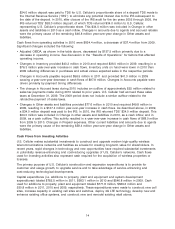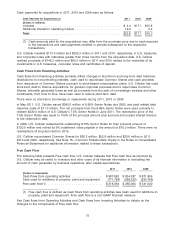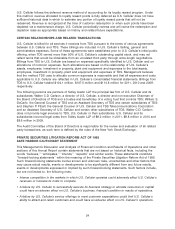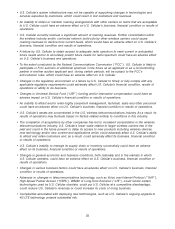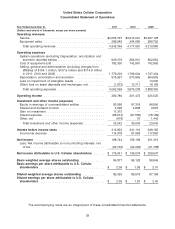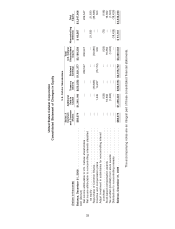US Cellular 2011 Annual Report Download - page 32
Download and view the complete annual report
Please find page 32 of the 2011 US Cellular annual report below. You can navigate through the pages in the report by either clicking on the pages listed below, or by using the keyword search tool below to find specific information within the annual report.U.S. Cellular follows the deferred revenue method of accounting for its loyalty reward program. Under
this method, revenue allocated to loyalty reward points is fully deferred as U.S. Cellular does not have
sufficient historical data in which to estimate any portion of loyalty reward points that will not be
redeemed. Revenue is recognized at the time of customer redemption or when such points have been
depleted via a maintenance charge. U.S. Cellular periodically reviews and will revise the redemption and
depletion rates as appropriate based on history and related future expectations.
CERTAIN RELATIONSHIPS AND RELATED TRANSACTIONS
U.S. Cellular is billed for all services it receives from TDS pursuant to the terms of various agreements
between U.S. Cellular and TDS. These billings are included in U.S. Cellular’s Selling, general and
administrative expenses. Some of these agreements were established prior to U.S. Cellular’s initial public
offering, when TDS owned more than 90% of U.S. Cellular’s outstanding capital stock, and may not
reflect terms that would be obtainable from an unrelated third party through arms-length negotiations.
Billings from TDS to U.S. Cellular are based on expenses specifically identified to U.S. Cellular and on
allocations of common expenses. Such allocations are based on the relationship of U.S. Cellular’s
assets, employees, investment in property, plant and equipment and expenses to the total assets,
employees, investment in property, plant and equipment and expenses of TDS. Management believes
that the method TDS uses to allocate common expenses is reasonable and that all expenses and costs
applicable to U.S. Cellular are reflected in U.S. Cellular’s consolidated financial statements. Billings from
TDS to U.S. Cellular totaled $104.1 million, $107.5 million and $114.8 million for 2011, 2010 and 2009,
respectively.
The following persons are partners of Sidley Austin LLP, the principal law firm of U.S. Cellular and its
subsidiaries: Walter C.D. Carlson, a director of U.S. Cellular, a director and non-executive Chairman of
the Board of Directors of TDS and a trustee and beneficiary of a voting trust that controls TDS; William S.
DeCarlo, the General Counsel of TDS and an Assistant Secretary of TDS and certain subsidiaries of TDS;
and Stephen P. Fitzell, the General Counsel of U.S. Cellular and TDS Telecommunications Corporation
and an Assistant Secretary of U.S. Cellular and certain other subsidiaries of TDS. Walter C.D. Carlson
does not provide legal services to TDS, U.S. Cellular or their subsidiaries. U.S. Cellular and its
subsidiaries incurred legal costs from Sidley Austin LLP of $9.2 million in 2011, $9.8 million in 2010 and
$8.6 million in 2009.
The Audit Committee of the Board of Directors is responsible for the review and evaluation of all related
party transactions, as such term is defined by the rules of the New York Stock Exchange.
PRIVATE SECURITIES LITIGATION REFORM ACT OF 1995
SAFE HARBOR CAUTIONARY STATEMENT
This Management’s Discussion and Analysis of Financial Condition and Results of Operations and other
sections of this Annual Report contain statements that are not based on historical facts, including the
words ‘‘believes,’’ ‘‘anticipates,’’ ‘‘intends,’’ ‘‘expects’’ and similar words. These statements constitute
‘‘forward-looking statements’’ within the meaning of the Private Securities Litigation Reform Act of 1995.
Such forward-looking statements involve known and unknown risks, uncertainties and other factors that
may cause actual results, events or developments to be significantly different from any future results,
events or developments expressed or implied by such forward-looking statements. Such factors include,
but are not limited to, the following risks:
•Intense competition in the markets in which U.S. Cellular operates could adversely affect U.S. Cellular’s
revenues or increase its costs to compete.
•A failure by U.S. Cellular to successfully execute its business strategy or allocate resources or capital
could have an adverse effect on U.S. Cellular’s business, financial condition or results of operations.
•A failure by U.S. Cellular’s service offerings to meet customer expectations could limit U.S. Cellular’s
ability to attract and retain customers and could have an adverse effect on U.S. Cellular’s operations.
24


